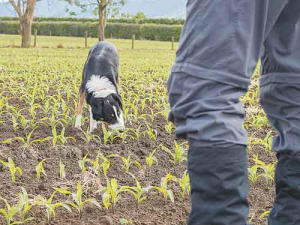Velvetleaf: New Zealand’s most aggressive cropping weed
Velvetleaf (Abutilon theophrasti) is an annual broad-leaved herb, originating in China, that can grow between 1 and 2.5 metres tall, with large heart-shaped leaves and yellow-orange flowers.
 Rusty and his handler John Taylor helped to sniff out velvetleaf on eight Waikato farms last month. They will return in late January-early February.
Rusty and his handler John Taylor helped to sniff out velvetleaf on eight Waikato farms last month. They will return in late January-early February.
Landowners and rural contractors are being urged to watch for pest plants.
Warm, humid weather means velvetleaf and other weeds will start appearing on farms, says Waikato Regional Council (WRC).
Helping to sniff out velvetleaf in Waikato last month was Rusty and his handler John Taylor, from Southland. They visited 12 high-risk farms, finding plants sprouting on eight of them. They’ll be back to do more work in late January and early February.
WRC’s biosecurity pest plants team leader Darion Embling says the wet winter and spring has delayed planting by farmers, but crops are now growing and now is the time to watch for and kill pest plants.
“Most farmers have done pre-emergence spraying but we’re hearing from those previously confirmed with velvetleaf infestations that seedlings are pushing through.
“This is a critical time for killing pest plants; hand-pulling seedlings and post-emergence spraying is essential.”
Landowners and rural contractors should look around gateways and the first 3-4 rows of crops for signs of velvetleaf. They can notify WRC for advice to avoid crop loss.
Seedlings are vigorous, with plants left untouched growing rapidly in the first few weeks after germination. Leaves are heart-shaped and velvety to the touch, and have a distinctive smell when crushed.
Velvetleaf grows up to 2.5m tall and has buttery-yellow flowers as it matures from spring to autumn.
This aggressive cropping weed is among the world’s worst. It competes with crops for nutrients, space and water, and its seeds can persist on farms for decades, even surviving digestion and silage.
A New Zealand dairy industry leader believes the free trade deal announced with India delivers wins for the sector.
The Coalition Government will need the support of at least one opposition party to ratify the free trade deal with India.
Primary sector leaders have welcomed the announcement of a Free Trade Agreement between India and New Zealand.
At Pāmu’s Kepler Farm in Manapouri, mating has wrapped up at the across-breed Beef Progeny Test.
More than 150 people turned up at Parliament recently to celebrate the 20th anniversary of Horticulture New Zealand (HortNZ).
Biosecurity New Zealand says Kiwis should continue to keep an eye out for yellow-legged hornets (Vespa velutina) over the holiday season.
President Donald Trump’s decision to impose tariffs on imports into the US is doing good things for global trade, according…
Seen a giant cheese roll rolling along Southland’s roads?